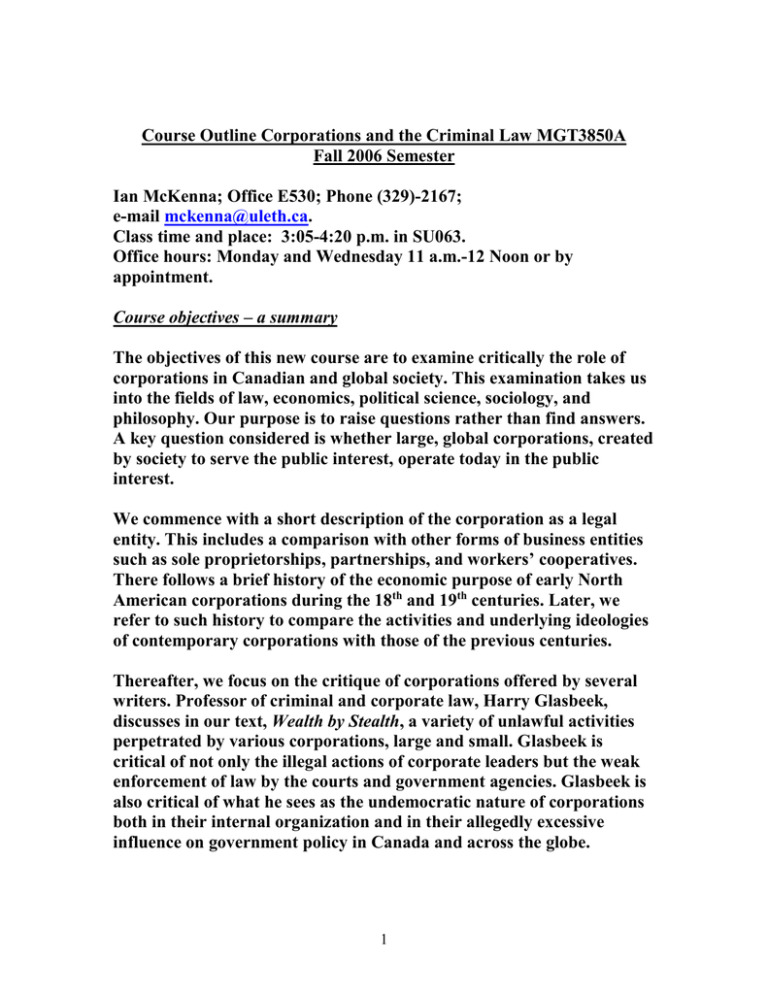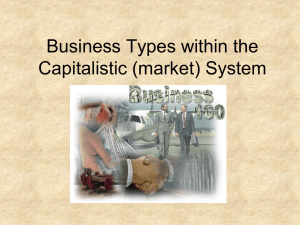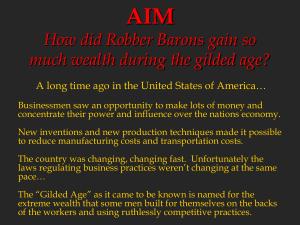
Course Outline Corporations and the Criminal Law MGT3850A
Fall 2006 Semester
Ian McKenna; Office E530; Phone (329)-2167;
e-mail mckenna@uleth.ca.
Class time and place: 3:05-4:20 p.m. in SU063.
Office hours: Monday and Wednesday 11 a.m.-12 Noon or by
appointment.
Course objectives – a summary
The objectives of this new course are to examine critically the role of
corporations in Canadian and global society. This examination takes us
into the fields of law, economics, political science, sociology, and
philosophy. Our purpose is to raise questions rather than find answers.
A key question considered is whether large, global corporations, created
by society to serve the public interest, operate today in the public
interest.
We commence with a short description of the corporation as a legal
entity. This includes a comparison with other forms of business entities
such as sole proprietorships, partnerships, and workers’ cooperatives.
There follows a brief history of the economic purpose of early North
American corporations during the 18th and 19th centuries. Later, we
refer to such history to compare the activities and underlying ideologies
of contemporary corporations with those of the previous centuries.
Thereafter, we focus on the critique of corporations offered by several
writers. Professor of criminal and corporate law, Harry Glasbeek,
discusses in our text, Wealth by Stealth, a variety of unlawful activities
perpetrated by various corporations, large and small. Glasbeek is
critical of not only the illegal actions of corporate leaders but the weak
enforcement of law by the courts and government agencies. Glasbeek is
also critical of what he sees as the undemocratic nature of corporations
both in their internal organization and in their allegedly excessive
influence on government policy in Canada and across the globe.
1
This raises the questions of whether corporations do diminish
democracy and, if so, whether that is significant. If it is significant, we
must address the questions of how democratic principles can be
strengthened by rendering corporations more accountable to society for
their actions. Glasbeek offers suggestions in this regard as do Grossman
and Adams in their article Exercising Power Over Corporations Through
State Charters. In Canada Bill C45 was passed amending the Criminal
Code of Canada to render employers criminally liable for harm caused
to employees. We shall consider various questions raised by the authors’
suggestions, and by the short run impact of Bill C45 on the criminal law
in Canada.
Readings (Others will be referred to during the semester).
Harry Glasbeek, Wealth by Stealth, (2003, Between the Lines,
Toronto). YOU SHOULD PURCHASE THIS BOOK –
AVAILABLE FROM THE BOOKSTORE).
* Yates, Bereznicki-Korol & Clarke, Business Law in Canada,
(2005, 7th edition, Pearson Prentice Hall, Toronto). READ
CHAPTERS 13 & 14. AVAILABLE ON LIBRARY RESERVE.
McInnes, Kerr, et al., Managing the Law; The Legal Aspects of
Doing Business, (2003, First Edition, Prentice Hall, Toronto).
READ CHAPTERS 18 & 19. AVAILABLE ON LIBRARY
RESERVE.
Richard L. Grossman & Frank T. Adams, Exercising Power Over
Corporations Through State Charters, in “The Case against the
Global Economy”, Jerry Mander & Edward Goldsmith (1996,
Sierra Club Books, San Francisco), pp. 374-392.
Carter Goodrich, Introduction; The Spirit of Improvement in
“Government Promotion of American Canals and Railroads
1800-1890”, pp. 1-16.
Achbar, Abbott & Bakan, The Corporation (Mongrel);
www.thecorporation.com
2
McCahery, Moerland, Raaijmakers, & Renneboog, Corporate
Government Regimes: Convergence and Diversity (2002, Oxford
University Press).
See also readings on class web page.
Outline of topics to be considered
1. Legal characteristics of corporations; comparison with other
forms of business organizations.
2. “Psychological characteristics” of corporations.
3. Historic purposes, functions, and ideologies of corporations.
4. The ideologies of competition, democracy and the public interest.
5. The role and activities of courts, legislators, and legal watchdogs
in establishing, controlling, and altering the powers of
corporations.
6. Examples of corporate infringement of law.
7. Arguments for and against greater legal intervention in the
activities of corporations.
8. The nature, purpose and effect of the Canada Criminal Code as
amended by Bill C45.
9. Other topics may be considered as raised by students in the class.
3
Assessment of Grade (% of course grade shown in brackets)
1. Mid-term Exam. Thursday October 26. Questions on matters
covered in class, the DVD “The Corporation” and readings
assigned in class prior to October 26, 2006.
(20%)
2. Group term paper. To be submitted on or before November 21.
Details of length and format will be discussed in class and
communicated to the class by me following discussion. (35%)
3. Class participation If you have more than two unexcused
absences during the semester you will receive no more that half
the marks assigned to class participation. Class participation will
be assessed on the quality of the questions you raise in class and
the quality of your answers to questions raised by me on matters
discussed in readings and the DVD “The Corporation”. (10%)
4. Final examination. Questions based on the Glasbeek text, and
matters covered in class, prescribed readings, and “The
Corporation”
(35%)
4





